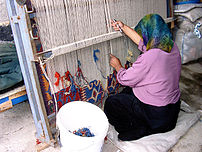Paul Imre has thrown out the challenge: what is Tribal IQ?
Metrics gurus will ultimately want a set of numbers. This is a take influenced by corporate anthropology. I have lifted it almost entirely from a one-pager written by Dr Phil Baird, Vice President of United Tribes Technical College in North Dakota. With slight modifications, Phil Baird’s vision for his college fits almost exactly what we have been talking about:
What does it mean to provide communication infrastructure for a community, which is, in its barebones, exactly what social media does?
Mirror who we are
#1 Tribal IQ defines who we are: our past, our present and our future. We define our IQ ourselves and we recreate it everyday in what do, with each other, and people around us.
Support the everyday re-creation of our community
#2 A community manager is keenly aware of the way we recreate our culture on a daily basis. Our mission is to support our members as they regenerate our group through everyday activities
Recognize the competing definitions and internal dynamism of the community
#3 Sometimes our groups are complicated. Within one community, we may have multiple groups who have competing demands and between them add an invigorating tension.
Range of our challenge
Our groups might have a narrow or broad focus, be superficial or deep, and be short or long-lasting. The issues defining the group might be concrete and specific, such as supporting Obama for President, or they might be helping diffuse and long-standing such as communicating with local government through FixMyStreet.
Expansion of the role of IT & Geeks
In this year of 2008, the question many of us are asking is how we are using social media to support the needs of our community. IT experts are being drawn directly into the discussion of who is our community and what are its needs. We are drawn into the discussion about how our community functions, how it expresses itself, and how it recreates itself on a daily basis. And not least, how we facilitate our community’s activities, how we affect its internal functioning, and how we make it easier to fulfill its needs, including, the need to reflect on its needs and change the way members interact with each other and the outside world.
Moral challenges of community managers
As resources are always limited, we have to prioritize and help our members prioritize. We have to map out clearly what we will do and align our map with the wider map of the community’s needs. In this way we are drawn into the debates on management and governance within our community, our tribe.
Strategic work of community managers
We also need to address the challenges appearing on the 10, 5, 3 and 1 year horizons. One of the challenges of community regeneration is the arrival of ‘digital natives’. Every generation brings with it the challenge of incorporating new members and new ways. The generation joining the adult ranks of voters, workers and managers are digitally savvy and bring with them new skills, different attitudes and higher expectations. They will refresh our communities and highlight they way we interact, on-line and off-line, and the way construct our past, create our present and co-create our future. As Dr Phil Baird said in 2007, “What will their Tribal IQ bring to our Tribal College?”
The challenge is no longer for the community to understand IT. It is for IT to understand community
Social media is here, and IT has become communal. The challenge is no longer for the community to understand IT. It is for IT to understand community. I believe we will see joint careers in managing IT and sociology, anthropology, political science and psychology.
I like the 21st century! Comments?
Next social media camp is on July 5 2008 in London – follow the link for immediate registration, presentations, details, and so on.
Related articles
Like this:
Like Loading...

